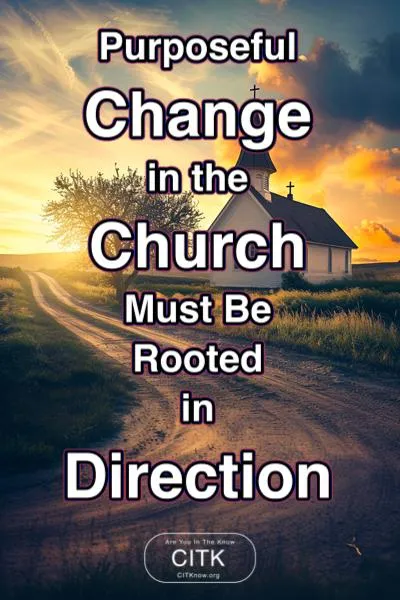See Our Blogs
Take a look at what's on our minds and let us know what you think. Your feedback is Appreciated.

Purposeful Change in the Church Must Be Rooted in Direction
"In a world of rapid change, the church must both hold steadfast to unwavering truths and be willing to adapt practices to meet the spiritual needs of today’s congregants. Purposeful change grounded in scripture can lead to profound growth and unity."
— Pastor Craig Groeschel,

Purposeful Change in the Church Must Be Rooted in Direction
Introduction
The desire for growth is inherent in any church, but growth must be rooted in purpose and direction. For pastors and church leaders, this means that change should not be for the sake of change alone. Instead, it should be a mindful process aimed at fostering meaningful growth. This blog post will guide you through recognizing the need for change, planning strategically, and implementing purposeful alterations to invigorate your congregation. By the end of this post, you'll have actionable insights to start making important changes in your church.
Recognizing the Need for Change
Assessing Current Challenges
Declining attendance and engagement are common issues faced by many churches today. According to the Pew Research Center, 65% of American adults identified as Christians in 2019, a 12-percentage point decrease from 77% in 2009. Additionally, the Barna Group reported that in 2020, only 29% of millennials attended church regularly. These statistics highlight the urgency for churches to evolve in ways that resonate with modern congregants.
Another significant challenge is the disconnect between generations within the church. A study by Fuller Youth Institute found that nearly 70% of young people who regularly attended church in high school stopped attending by age 23. This generational gap can create tension and hinder church growth if not addressed.
Stagnant worship practices can also contribute to declining engagement. The Hartford Institute for Religion Research notes that 40% of congregants prefer a mix of traditional and contemporary worship styles. Without variety, worship services can feel monotonous and fail to inspire.
Evaluating Congregant Feedback
Before making any changes, it's crucial to understand your congregation's needs and desires. Surveying opinions on current worship practices can provide valuable insights. For example, you might find that younger members crave more contemporary music, while older members cherish traditional hymns.
Identifying unaddressed needs is equally important. Perhaps your church lacks programs for young families or doesn't offer enough opportunities for community involvement. Gathering feedback through surveys, focus groups, and one-on-one conversations can help you pinpoint areas for improvement.
The Philosophical Foundation for Change
Biblical Justification
Scriptures support growth and adaptability, which can serve as a foundation for your changes. Romans 12:2 advises, "Do not conform to the pattern of this world, but be transformed by the renewing of your mind." This verse encourages transformation and alignment with God's will.
Matthew 9:17 also provides insight, stating, "Neither do people pour new wine into old wineskins. If they do, the skins will burst; the wine will run out, and the wineskins will be ruined. No, they pour new wine into new wineskins, and both are preserved." This metaphor highlights the importance of creating new structures to support new growth.
Historical Examples
Changes in church practices over centuries demonstrate the church's ability to adapt successfully. For instance, the early church transitioned from meeting in homes to establishing formal places of worship. More recently, many churches have embraced digital technology to reach wider audiences.
Successful adaptation stories from other congregations can offer practical examples. Grace Community Church, for example, successfully combined traditional and modern worship styles to increase attendance by 30% over two years. By studying these examples, you can gain inspiration and strategies for your own church.
Strategic Planning for Purposeful Change
Setting Clear Objectives
Define your goals clearly. Are you aiming for spiritual growth, community engagement, or both? Setting measurable objectives helps track progress and ensures that your efforts align with your church’s mission. For instance, you might aim to increase weekly attendance by 20% within a year or boost participation in community service projects.
Balancing tradition with innovation is key. While it’s essential to introduce new elements, it's equally important to respect and preserve cherished traditions. This balance can help maintain unity within the congregation and make the transition smoother.
Involving Key Stakeholders
Creating a leadership team is crucial for successful change implementation. This team should include diverse representatives, such as youth leaders, worship coordinators, and long-standing members. Their input can provide a well-rounded perspective on potential changes and help build consensus.
Engaging the congregation through open forums and discussions fosters transparency and inclusivity. By involving members in the decision-making process, you can address concerns, gather ideas, and build a sense of collective ownership over the changes.
Implementing Changes Gradually
Phased Approach to Modernization
Introducing contemporary elements in worship can be done gradually to avoid overwhelming the congregation. Start by incorporating modern worship songs occasionally, then increase their frequency based on feedback. Enhancing church facilities and technology, such as upgrading sound systems or adding multimedia presentations, can also be phased in.
A gradual approach allows members to adjust and provides opportunities to evaluate the impact of each change. This method also helps mitigate resistance and ensures a smoother transition.
Educational Workshops and Training
Training worship leaders and volunteers is essential for successful change implementation. Workshops can equip them with the skills needed to lead modern worship sessions effectively. Additionally, organizing workshops for congregants can help them understand and appreciate the changes.
Providing educational resources, such as articles, books, and videos, can further support the congregation during the transition. Continuous learning opportunities foster a culture of growth and adaptability.
Case Studies of Purposeful Change
Harmony Fellowship Church
Located in the heart of the Midwest, Harmony Fellowship Church faced a significant decline in attendance, particularly among younger congregants. Pastor Alan initiated a phased approach, starting with a survey to gauge congregant preferences. The results showed a desire for contemporary music and more engaging sermons.
To address concerns from older members, Pastor Alan organized town hall meetings to discuss the changes and their scriptural justifications, focusing on passages like Romans 12:2. Over two years, the church saw a 30% increase in attendance, particularly among families and young adults.
Grace Haven Church
This church experienced significant generational gaps within its congregation. Reverend Lisa spearheaded a strategic plan to gradually integrate contemporary elements into worship. The leadership team started by introducing modern worship songs once a month, complementing the existing liturgical framework.
Over three years, the church transitioned to a blended worship model that incorporated contemporary music, interactive sermons, and multimedia. This approach revitalized the congregation, doubling attendance from younger demographics.
Hope Community Church
Hope Community Church faced stagnation in spiritual growth and involvement. Pastor Jordan focused on musical diversity, drawing from biblical premises like Psalms 150 and John 4:24. The church's leadership formed a task force that explored different worship music styles.
Pilot services featuring various musical genres were conducted, and feedback was solicited. After a year, Harvest Fellowship Church experienced rejuvenation, with increased attendance and involvement from younger congregants.
Measuring the Impact of Change
Monitoring Attendance and Engagement
Tracking growth in church activities and analyzing participation across different age groups can provide valuable insights. Use metrics such as attendance numbers, volunteer participation, and event turnout to gauge the impact of changes.
Regularly scheduled review meetings can help assess progress and make necessary adjustments. Continuous monitoring ensures that changes are effective and aligned with your goals.
Collecting and Acting on Feedback
Continuous feedback loops are essential for ongoing improvement. Encourage congregants to share their thoughts and experiences through surveys, suggestion boxes, and open forums. Acting on feedback demonstrates that the leadership values congregants' opinions and is committed to creating a positive worship experience.
Maintaining the Balance Between Tradition and Innovation
Respecting Core Doctrines
Ensuring all changes align with biblical teachings is crucial for maintaining the church's spiritual integrity. Any modifications should enhance, not compromise, the core doctrines. This respect for tradition helps preserve the church's identity and mission.
Celebrating Tradition
Keeping traditional elements alive fosters a sense of continuity and stability. Celebrating church history and heritage through special events, commemorations, and storytelling can strengthen the congregation's connection to its roots.
Encouragement for Pastors
Scriptural Encouragement for Leadership
Quotes from scripture can provide strength and guidance for pastors leading change. For example, 1 Timothy 4:12 encourages leaders to set an example in speech, conduct, love, faith, and purity. John 4:24 emphasizes worshiping in spirit and truth, underscoring the importance of authenticity in worship.
Personal Reflections and Anecdotes
Stories from pastors who led transformative changes can offer inspiration and practical insights. Sharing personal experiences and lessons learned can help other pastors feel empowered and supported in their efforts.
Additional Resources
Books and Articles
Recommendations for further reading on church growth and change management can provide valuable knowledge. Key resources might include "Leading Change" by John P. Kotter and "The Purpose Driven Church" by Rick Warren.
Technological Tools
Tools to aid in the transition process, such as worship planning software and online community platforms, can facilitate smooth implementation. Resources like Church In The Know's software can enhance organization and communication within the church.
To Wrap It Up
Purposeful change is essential for fostering meaningful growth in churches. By assessing current challenges, involving key stakeholders, and implementing changes gradually, pastors can create a vibrant and engaged congregation.
Final Encouragement
Change, when rooted in purpose and direction, can lead to profound growth and unity. Pastors are encouraged to embrace change thoughtfully and prayerfully, guided by scripture and the needs of their congregation.
Invitation to Engage
If you have questions or need personalized guidance, reach out to Church In The Know for support. Our team is here to help you navigate the process of purposeful change in your church.
Miss Sherrie B.
Atlanta, GA

"I am really impressed with the functionality. The system is easy to use and easy to navigate. I like that it consolidates many of the marketing services we use into one location."
Miss. V.C
Louisville, KY

"OMG... this is the most user friendly application I have ever encountered! In a nutshell!"
Dr. Lydia N
West Memphis, AR

"Wow! It's great to finally have everything in one place. This puts me in the driver seat as the administrator and makes my job much easier. Love it!"
Get In Touch
Email: [email protected]
Address
Office: 8101 Boat Club Rd. STE 240 #252
Assistance Hours
Mon – Sat 9:00am – 8:00pm
Sunday – CLOSED
Phone Number:
(817) 242-2434
The Next Level of CRM Innovation
Get in the know, with Church in the Know!
© 2026 Church In The Know - All Rights Reserved,

